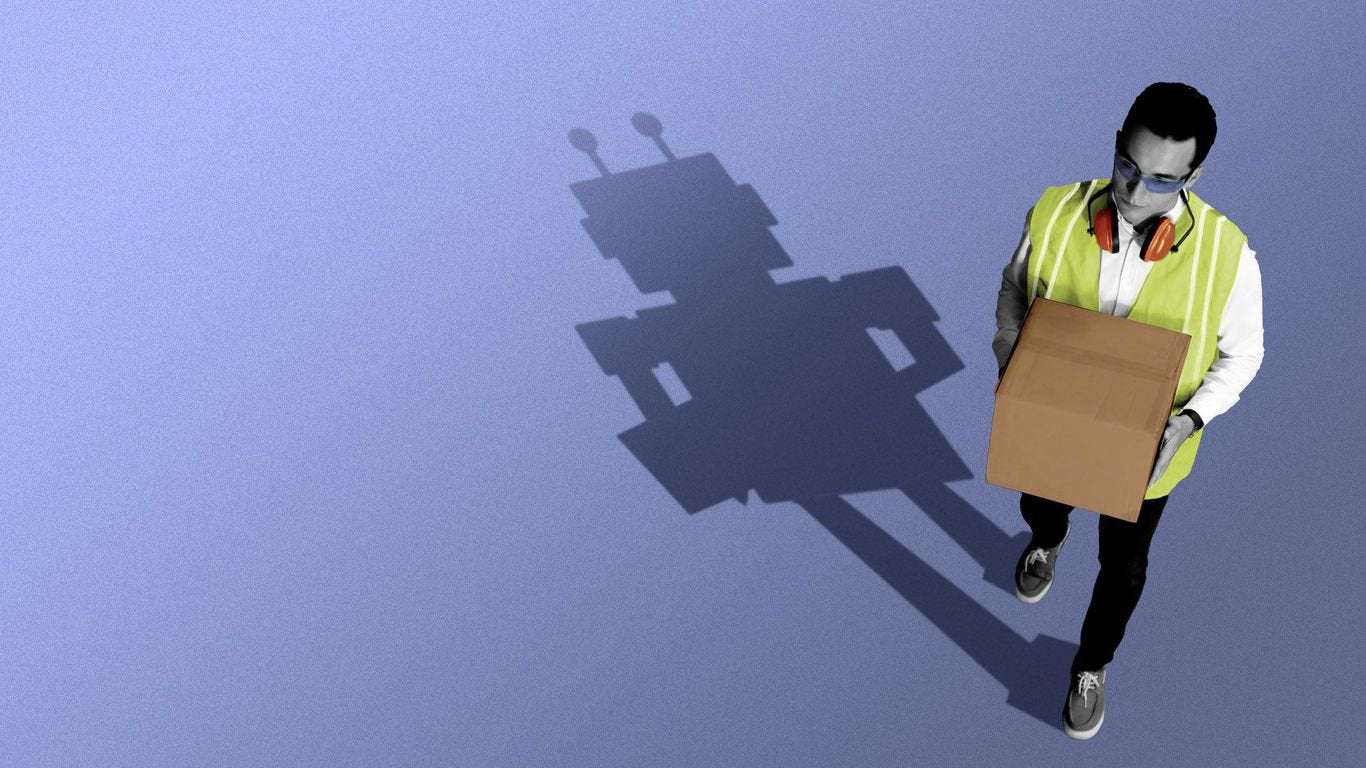More than outright destroying jobs, automation is changing employment in ways that will weigh on workers.
The big picture: Right now, we should be less worried about robots taking human jobs than people in low-skilled positions being forced to work like robots.
What's happening: In a report released late last week about the post-COVID-19 labor force, McKinsey predicted 45 million U.S. workers would be displaced by automation by the end of the decade, up from 37 million projected before the pandemic.
That increase is a function both of permanent changes in the economy because of the pandemic — less business travel and more remote work — as well as an acceleration in investment in automation and AI.
Yes, but: McKinsey notes that despite the displacements, the total number of jobs is projected to increase.
"We often first think of the substitution argument, but throughout history, complementation or augmentation [with automation] has been much more important, and I think that's going to be true for the next decade," says Erik Brynjolfsson, a senior fellow at the Stanford Institute for Human-Centered AI.
The catch: McKinsey finds that while the total number of jobs will increase, “nearly all net job growth over the next decade is projected to be in high-wage occupations" — which is not good news for workers with low job skills.
And there are a lot of them — a 2016 OECD report found 14% of the U.S. working-age population had low literacy skills, 23% had low numeracy skills and 62% had low digital problem-solving skills.
Zoom in: To better understand the effect of automation on employees in low-skilled jobs, Brynjolfsson and Matt Beane of the University of California-Santa Barbara (UCSB) have been carrying out detailed studies of one field that has experienced tremendous employment growth recently: e-commerce warehouses.
Beane and Brynjolfsson are working with eight companies commercializing AI-enabled robotics in pick-and-pack facilities to determine how e-commerce warehouses are instituting automation, and how the front-line workers are adapting to it.
Details: Some of their early findings underscore why simply introducing robots — especially in jobs that involve a lot of unpredictable, fine manual work — doesn't instantly lead to wholesale job destruction.
"Our research has shown that it takes a lot longer than you expect after automation is introduced for companies to figure out how to get value from it," says Beane.
Economic productivity after the introduction of automation and AI tends to follow a J-curve — remaining static or even dipping as companies spend time and money to adapt to technology, before rising rapidly once the implementation phase is completed.
Between the lines: But what Beane and Brynjolfsson have discovered during detailed interviews with e-commerce employees and visits to warehouses is that humans themselves are already working in more automated ways.
"Warehouses" — which have very narrow profit margins — "have engineered the environment to make the human ability to cope with uncertainty as close as possible to automation," says Beane. "They want fewer skilled touches over time to make money."
That in of itself isn't new, but for e-commerce warehouse workers — often in geographically isolated locations, working long shifts, and unable to effectively unionize — that means there is "no energy or time to learn the new skills" that would help them get ahead of automation.
geographically isolated locations, working long shifts, and unable to effectively unionize — that means there is "no energy or time to learn the new skills" that would help them get ahead of automation. "You are essentially a robot while doing this job," says Beane. But what might be worse is the way that human workers "become institutionalized to that robotic job by the constraints of the environment."
"I would be hard-pressed to think of an industry in human history where we created jobs that require so little of people."
What to watch: How quickly industrial robots are developed that can handle the uncertainty and fine manual work of e-commerce warehouses as well as human laborers.
"The minute you can crack the problem of uncertainty, millions of jobs will be automated if the political climate allows it," says Beane.
The bottom line: Without better government support, U.S. employees with low job skills increasingly face a future of working like a robot — if at all.
Go deeper: The robo-job apocalypse is being delayed

ISeeEverythingYouDo on February 28th, 2021 at 04:49 UTC »
There currently is a planet where all jobs are conducted by robots.
Ryan_Parmelee on February 28th, 2021 at 03:04 UTC »
Unpopular opinion but I believe one of our goals for humanity should be to replace almost ALL jobs but do it in a way in which everyone benefits from the wealth created by AI and automation. Through a UBI or other means. There will always be a small percentage of work that still needs to be done for the people who want to earn extra income. This would allow everyone complete freedom to anything they want with their lives. This is a far off goal but I believe it will be reality one day.
ploomyoctopus on February 28th, 2021 at 01:21 UTC »
This isn't particularly new. In fact, the "machine metaphor" was quite popular during the industrial revolution, and still remains not-uncommon today (as your post indicates). Ironically, we clearly haven't learned from the past, since later research showed that treating people like people improves their productivity.